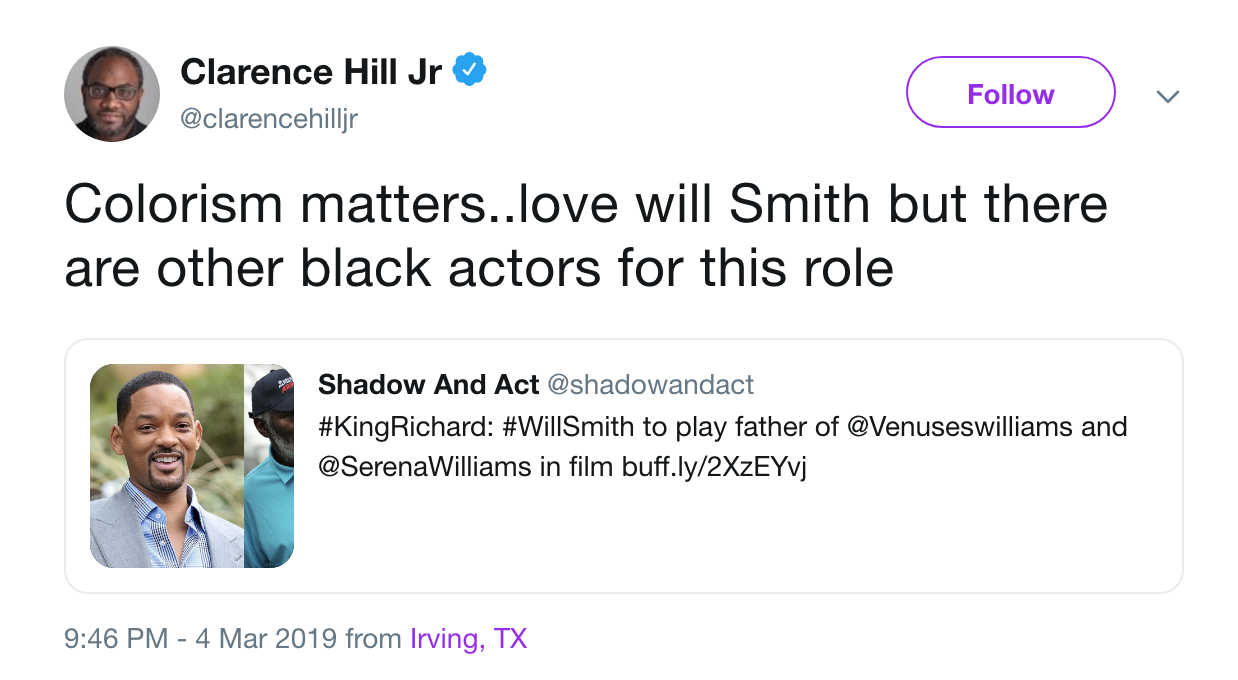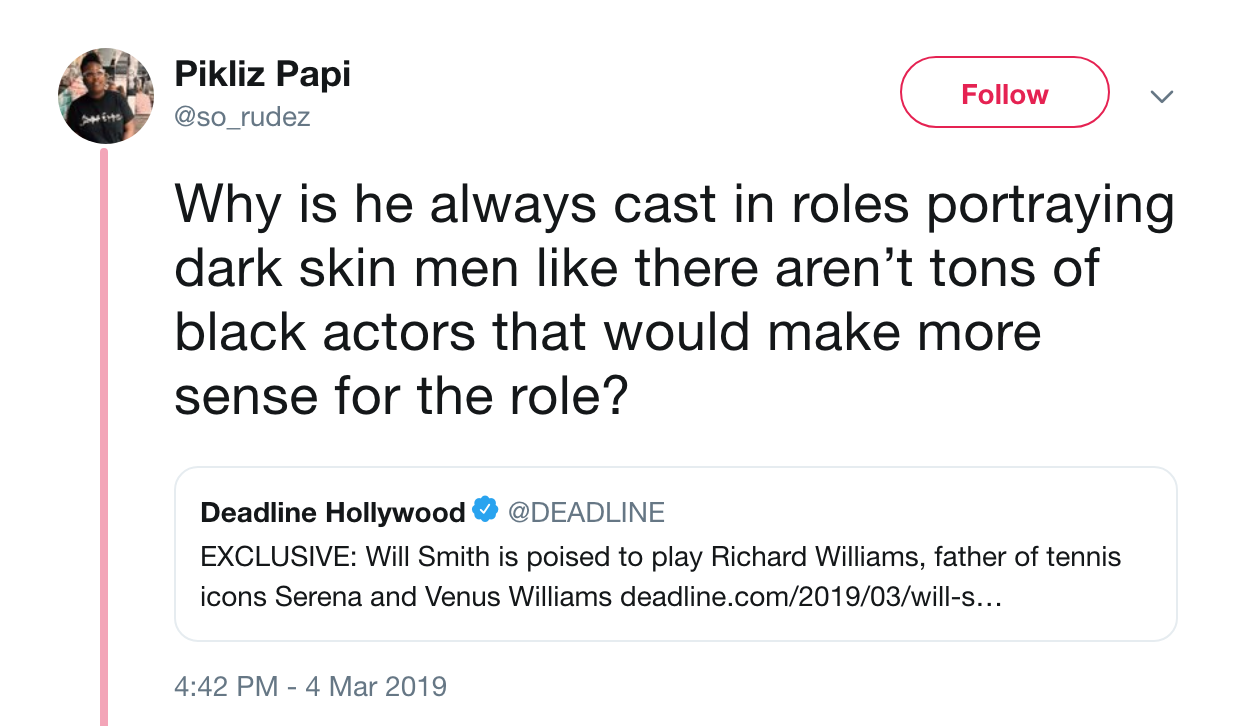
Perhaps it’s “light-brown privilege” — or something (un)like that. Actor Will Smith famously starred in the Men in Black film series, but now some critics are complaining that he’s not black enough to play his latest prospective role. No foolin’.
As the Inquirer Daily News reports:
Is there such a thing as the wrong shade of black?
To some on social media, the idea of Philly native Will Smith playing the role of Richard Williams, the father of [tennis stars] Venus and Serena Williams, in an upcoming film called King Richard is a case of colorism.
Over and over, the criticism has been lobbed: “He’s too light-skinned.”
… Colorism is defined as a bias against people based on their skin color. In the United States and globally, colorism is often first experienced within one’s own ethnic group, often lighter-skinned people discriminating against others because their skin is darker.
Now, let’s be blunt (and not dull): This prejudice is evident within certain U.S. minority groups. Heck, there’s a reason why bleaching creams are popular in Asia — and glutathione antioxidant treatments, which can deactivate the enzyme that produces darker skin pigments — are popular there and are increasingly so here. There’s a reason why black writer Ronald Hall wrote last year of “light-skinned blacks occasionally being accused of not being ‘black enough,’” but, on the other hand, also stated that while “they might criticize lighter-skinned black people, many people of color — deep down — abhor dark skin.”
Yet while it might have been different 70 years ago, this just isn’t “a thing” in the white community; I don’t, for instance, witness prejudice among whites against swarthy citizens of Greek or Italian descent. Let’s keep it real.
But whether it’s garden-variety prejudice or jealously, or whether the latter induces the former here, Will Smith is hearing that he’s not authentic. Just consider the following tweets:
Note that my Microsoft Word program flags “colorism” as a mistake because, actually, it is one: a social mistake. It’s another Lexicon of the Left term conjured up because liberals can’t cause enough trouble with the million-plus English words already in existence, so their neologisms need to keep pace with their ever metastasizing gripes.
Smith shouldn’t feel alone, though: Similar complaints have been made against white actors/characters for a long time. As I wrote last year:
For example, white actor Ed Skrein was pressured into backing out of a 2017 Hellboy role, with accusations of “whitewashing,” because the character he’d have played was of Asian descent in a comic book.
But this isn’t new. Even more ridiculous was the 1990 incident in which Actors’ Equity denied permission “for the English actor Jonathan Pryce to appear on Broadway next spring in the role of the Eurasian pimp that he created in the hit London musical ‘Miss Saigon,’” as the New York Times reported.
So let’s get this straight. It’s somehow wrong for an all-white actor to play a half-white, half-Asian character, but it’s okay for an all-Asian actor to do so. Huh? I guess some halves are more equal than others.
In fact, as I also wrote, it’s
applauded when white characters are rebranded as non-white (or male ones as female). This has been proposed even with legendary fictional secret agent James Bond, whom some would recast as black or female. Then there are these examples:
• In the 2017 film Thor: Ragnarok, the Norse figure Valkyrie was played by Afro-Latina actress Tessa Thompson.
• The 2005 remake of The Honeymooners portrayed the originally white characters as black.
• Hellboy comic-book’s white Irish-descent character Alice Monaghan has been cast as a black woman in an upcoming film reboot.
• Superhero Spiderman was always the alter ego of white New Yorker Peter Parker — until he was transformed into black-Latino Miles Morales.
• In Fantastic Four (2015), white character Johnny Storm (Torch) was portrayed as black.
• Famed black actor Morgan Freeman has played Shakespeare’s white “Petruchio” in The Taming of the Shrew.
Additionally, we’ve now had a female Dr. Who, a black Heimdall and Wilson Fisk, and an Asian La Femme Nikita, to name just a few more examples.
Unsurprisingly, the Left can explain away this double standard: If a minority plays a white role, it’s progress and necessary “creation of opportunities.” If a white person plays a non-white role (or now even privately dresses as a minority), it’s “cultural appropriation.”
Of course, not long ago whites who wouldn’t partake of “non-white culture” might have been considered provincial and ethnocentric. It’s another example of how liberalism, being not an ideology but a process (of ever trying to change the status quo), breeds adherents who’ll always find something about which to complain.
Thus do we have today’s logic: A boy can play a girl in real life just by willing it — but an actor can’t play a darker-complected character on screen. And when the boy takes on a girl’s appearance, it’s not sexual appropriation and sexism, but if the actor darkens his skin, it’s racism.
So given this confusing picture, some exit questions: Could Will Smith be in a movie titled 50 Shades of Brown? What kind of actor could star in a remake of The Color Purple? And will we actually have to find blue aliens to make the next Avatar film?
In reality, the more serious problem here is I.Q. appropriation: when stupid people try playing smart ones in media and elsewhere and disgorge concepts such as “colorism.” Surely, there must be intelligent candidates who can fill these roles.
Photo of Will Smith: AP Images






